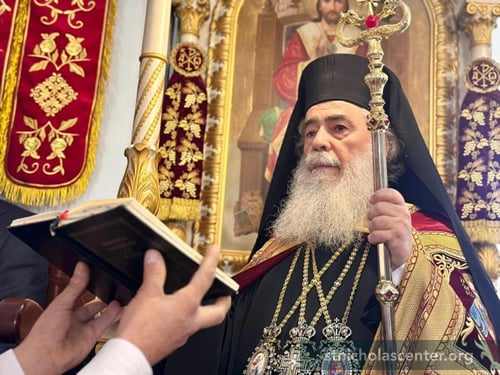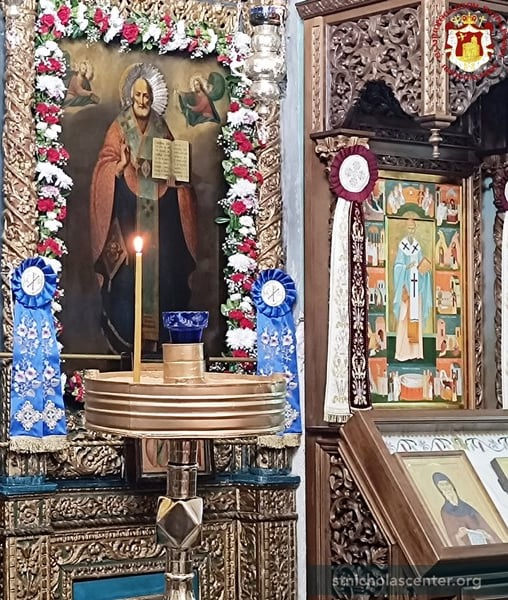Sermon on the Feast of Saint Nicholas
by His Beatitude the Patriarch of Jerusalem, Theophilos II


Saint Nicholas Orthodox Church
Beit Jala, Palestine
December 19, 2024
"The truth of things hath revealed thee to thy flock as a rule of faith, an icon of meekness, and a teacher of temperance; for this cause, thou hast achieved the heights by humility, riches by poverty. O Father and Hierarch Nicholas, intercede with Christ God that our souls be saved" (Apolytikion), thus the hymnographer of the Church exclaims.
Beloved in Christ brothers and sisters,
Devout Christians and pilgrims,
The grace of the Holy Spirit has gathered us all together in this renowned sacred Church of Saint Nicholas, that we may honour with festivity his holy and venerable memory.
Our Father, the Hierarch Nicholas, who flourished during the reign of the pious Roman Emperor Constantine the Great, and was one of the 318 Holy Fathers at the First Ecumenical Council in Nicaea in the year 325, stands out among the Fathers of the Church not for his written works, but for his miracles, which he performed by the power of the Holy Spirit, as Saint Paul proclaims, saying: "For our gospel came not unto you in word only, but also in power, and in the Holy Ghost" (1 Thessalonians 1:5, KJV). Moreover, he became a great Hierarch, that is, a true shepherd, following the Chief Shepherd Christ, who said: "I am the good shepherd: the good shepherd giveth his life for the sheep" (John 10:11, KJV).
According to the hymnographer of the Church, our Father Nicholas had the distinct qualities that define the good Shepherd. He was revealed as a "rule of faith," an "image of gentleness," and a "teacher of self-control."
Saint Nicholas was revealed as a "rule of faith" because he preserved the consignment, that is, the truth of the Gospel, which the esteemed and holy 318 Fathers of the Church carefully formulated and firmly established by the illuminating power and work of the Holy Spirit at the First Ecumenical Council in Nicaea.
The blessed Nicholas was distinguished as an "image of gentleness," hearing the command of the Lord Jesus Christ: "Take my yoke upon you, and learn of me; for I am meek and lowly in heart: and ye shall find rest unto your souls" (Matthew 11:29, KJV). In other words, our holy Father became a disciple of Christ by obeying His words: "Learn of me; for I am meek and lowly in heart" (Matthew 11:29, KJV).
Explaining the Lord's words, Zigavinos says: "He did not say meek and lowly only, but lowly in heart, that is, lowly in soul, in will. And this, because, according to the blessed Paul, the fruit of the Spirit is love, joy, peace, long-suffering, gentleness, goodness, faith, meekness, temperance" (Galatians 5:22-23, KJV).
"The fruit of this Holy Spirit, namely, self-control, was revealed in the life of Bishop Nicholas, who became a partaker and teacher of this virtue. He called upon the preaching of the God-inspired, eminent Apostles: Paul, who said: 'For a bishop must be blameless, as the steward of God; not self-willed, not soon angry, not given to wine, no striker, not given to filthy lucre; but a lover of hospitality, a lover of good men, sober, just, holy, temperate' (Titus 1:7-8, KJV),[The Bishop must be blameless, self-controlled, holding fast the faithful and trustworthy word of the apostolic teaching]. And Peter, who said: 'And beside this, giving all diligence, add to your faith virtue; and to virtue knowledge; and to knowledge temperance' (2 Peter 1:5-6, KJV).
Faith, gentleness, and self-control were the virtues that adorned the Hierarch Nicholas. These were the contents of the catechesis of the Gospel of God's Word. These are the gifts of the Holy Spirit. 'But the manifestation of the Spirit is given to every man to profit withal. For to one is given by the Spirit the word of wisdom; to another the word of knowledge by the same Spirit; to another faith by the same Spirit; to another the gifts of healing by the same Spirit' (1 Corinthians 12:7-9, KJV), the blessed Paul preaches."
It is noteworthy that to the humble Hierarch Nicholas was also granted 'the gifts of healings' (1 Corinthians 12:9), that is, the gift of healing the sick, for which he was also given the title of the wonderworker. This is attested by his hymnographer, who says: "As a manifestly peerless physician of grave maladies of all kinds, O Father Nicholas, heal the infirmity of my soul and give me strength to cry: O God of our Fathers, blessed art Thou" (Matins, Ode 7, Troparion 4 of the Saint). And again the hymnographer exclaims, saying: 'The Lord greatly glorified you in miracles, both while living and after your end, Nicholas, Hierarch; for who, with all faith, has called upon your holy name, and was not immediately heard, finding you as a fervent intercessor?'
Today, our holy Church, my beloved brethren, blesses the divine life of our holy Father Nicholas, who was illumined by the unapproachable Light. He came to the Holy Land, especially to your holy city, to venerate the God-revealing Grotto of the Nativity, namely the birthplace of our God and Saviour Christ, in Bethlehem. He came to this humble cave because in it was fulfilled the great mystery of the Incarnation of the Son and Word of God from the pure blood of the ever-virgin Theotokos Mary, as the hymnographer says: 'A strange and paradoxical mystery I see! The cave is heaven; the throne of the Cherubim is the Virgin; the manger is the place in which the Uncontainable One, Christ God, has been laid; whom, as we sing, we magnify".
The place, that is, the space and the area of the humble manger, was deemed worthy to welcome the Most Blessed Virgin Mary, who reclined in it, the Uncontainable God as an infant. God, according to the holy John of Damascus, "God, being incorporeal and indescribable, does not exist in a place; for He Himself is the place of His own, in which He fills all things and is above them, and He Himself sustains them".
This "strange and paradoxical" mystery, my beloved, came to pass for the salvation of us, the people. Therefore, we are also called to celebrate the Nativity of Christ, imitating our Holy Father Nicholas, who transformed his soul and heart into a manger, where "the Uncontainable Christ reclined". And the holy John the Evangelist commands us, saying: "Love not the world, neither the things that are in the world. If any man love the world, the love of the Father is not in him. For all that is in the world, the lust of the flesh, and the lust of the eyes, and the pride of life, is not of the Father, but is of the world. And the world passeth away, and the lust thereof: but he that doeth the will of God abideth forever" (1 John 2:15-17, KJV).
This is the way to glorify the Birth of Christ, and this is the way to meet the Christ who came down from the heavens. Amen. Many years, peaceful and blessed Christmas.
Link
From "The Feast of Saint Nicholas at the Patriarchate," Jerusalem Patriarchate, December 20, 2024, permitted use citing source.

